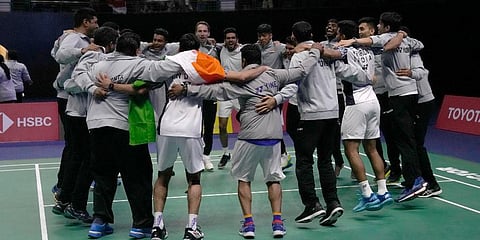

Clenched-fist yells, goosebumps, unbridled joy of achieving the unachievable and myriad emotions are some moments that define sports.
Those moments will remain etched in the memory to give hope when there is despair; joy when there is none, and belief in the face of failure.
The sight of the Indian team breaking into unrestrained jubilation with song and dance after winning the Thomas Cup for the first time in the country's history only shows the enormity of success. And, of course, the beauty of sport.
Though winning the Cup could be considered an oddity but when it comes to achievability of the target, there was always a chance, maybe a whiff of it.
Yes, there were naysayers, but there were believers too. India had to surmount obstacles but, hey, sports is all about stumbling and getting up.
Once India fielded their strongest team, winning became possible. For the novelty of record, Indonesia, the team India beat in the final on Sunday, had won 14 titles already.
Having an Olympic medallist (Anthony Ginting) as well as world champions (Mohammad Ahsan and Hendra Setiawan) in the mix meant they began as slight favourites.
Odds shifted in favour of India once they beat the indomitable Danes in the semifinals.
The challenge this year was led by veteran Kidambi Srikanth, emerging champion Lakshya Sen, fighter HS Prannoy, doubles exponents Satwiksairaj Rankireddy and Chirag Shetty and the supporting cast of Dhruv Kapila, MR Arjun, Krishna Prasad Garaga, Priyanshu Rajawat and Vishnuvardhan Goud Prajala.
Thomas Cup is not just about individual talent, it's about the team.
The main tenet of success would be all spokes lending support to the weight around it. In terms of depth, perhaps this is one great example.
India didn't always have it.
It took some years.
With the emergence of Lakshya and the duo of Satwik and Chirag, the team had the ability for a collective hurrah. Let's not discount Badminton Association of India and its think-tank's efforts too.
Badminton always showed promise. After Saina Nehwal's Olympic bronze in London 10 years ago and the foresight of untiring chief national coach P Gopichand, the sport was destined for greater heights.
In the women's section, India continued its progress with PV Sindhu's exceptional performances at the Olympics and Worlds.
It helped in popularising the sport. It also brought fame and money; sponsors and endorsements. But in men's, despite Srikanth securing the World No 1 spot four years ago, there was no medal to show at the Olympics.
In the World Championships and Super Series events, however, they were recording wins. Thomas Cup remained a Holy Grail, something that India could only dream about.
Gopichand always believed that the top players should be playing in the Thomas and Uber Cup.
Last year's Olympics was not as smooth for men. In the run-up to the Olympics, there were issues, from coaches to support staff. After Olympics, there were calls for changes, even in BAI's administrative set-up. Processes and systems were in place but needed overhaul.
They hired the right coaches for the players. For instance, when doubles coach Mathias Boe's contract got over, the two were still consulting him through zoom sessions before he was hired just before the Thomas Cup. The two won their first Super Series 500 title this year and have been consistent.
Another heartening thing is the age of the team. On the one hand, there is Lakshya at 20 and on the other there was Prannoy, nearing 30 years, and Srikanth who is 29.
Satwik is 21 and Chirag is 24. The rest of the team too is young and as time goes by, this generation will gain more experience.
This would also augur well for the next Olympics (2024), an event in which Indian men have punched below their weight.
Like U Vimal Kumar, one of the coaches of the team in Bangkok rightly pointed out, it was a team effort and that the two senior players motivated the youngsters and shouldered the responsibility.
"It was a fantastic team effort including the coaches," he said.
Even selection of the team was radical.
Prannoy was picked in a controversial manner but he vindicated the faith reposed on him. Like Vimal pointed out, there was bonhomie in the team.
The seniors guiding the juniors, the coaches strategising and contributing and everyone coming together for this extraordinary victory. All well but challenges remain.
Perhaps, this is just a precursor to bigger achievements for men in the future. And Olympics is just two years away.